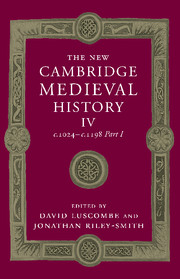Book contents
- Frontmatter
- 1 Introduction
- 2 The Rural Economy and Demographic Growth
- 3 Towns and the Growth of Trade
- 4 Government and Community
- 5 The Development of Law
- 6 Knightly Society
- 7 War, Peace and the Christian Order
- 8 The Structure of the Church, 1024–1073
- 9 Reform and the Church, 1073–1122
- 10 Religious Communities, 1024–1215
- 11 The Institutions of the Church, 1073–1216
- 12 Thought and Learning
- 13 Religion and the Laity
- 14 The Crusades, 1095–1198
- 15 The Eastern Churches
- 16 Muslim Spain and Portugal: Al-Andalus and its Neighbours
- 17 The Jews in Europe and the Mediterranean Basin
- 18 Latin and Vernacular Literature
- 19 Architecture and the Visual Arts
- List of Primary Sources
- Bibliography of secondary works arranged by chapter
- Index
- Frontispiece">
- Plate section"
- References
12 - Thought and Learning
Published online by Cambridge University Press: 28 March 2008
- Frontmatter
- 1 Introduction
- 2 The Rural Economy and Demographic Growth
- 3 Towns and the Growth of Trade
- 4 Government and Community
- 5 The Development of Law
- 6 Knightly Society
- 7 War, Peace and the Christian Order
- 8 The Structure of the Church, 1024–1073
- 9 Reform and the Church, 1073–1122
- 10 Religious Communities, 1024–1215
- 11 The Institutions of the Church, 1073–1216
- 12 Thought and Learning
- 13 Religion and the Laity
- 14 The Crusades, 1095–1198
- 15 The Eastern Churches
- 16 Muslim Spain and Portugal: Al-Andalus and its Neighbours
- 17 The Jews in Europe and the Mediterranean Basin
- 18 Latin and Vernacular Literature
- 19 Architecture and the Visual Arts
- List of Primary Sources
- Bibliography of secondary works arranged by chapter
- Index
- Frontispiece">
- Plate section"
- References
Summary
a wealth of material illustrating beliefs and thought, magic and ritual, knowledge of this world and other worlds – imagined or believed – survives in painting, sculpture, chronicles, sermons, penitentials, collections of miracles, synodal legislation, saints’ lives, romance literature and elsewhere, but this chapter is principally devoted to the more structured, formal patterns of teaching and learning which no doubt impinged less closely on the lives of the many than of the few. The levels of knowledge (practical and theoretical, profane and religious) attained and enjoyed by people who did not undergo a formal education outside of their family circle is not directly our subject here, but laypeople and clerics did not live in wholly separate worlds, and literacy among the laity, especially the nobility, should not be underestimated. Many laypeople received at least an elementary education and sometimes continued with study. Important as the role of the better-educated clergy was in promoting literacy and especially the reading and writing of Latin, laymen who might be ignorant of Latin and unable to write manually were sometimes able to read their own vernacular language. Peter Valdès, a layman, asked two clerics in the late twelfth century to translate the gospels into the vernacular so that he could read them and share them with his community of lay people in Lyons. Nobles, whether able or unable themselves to read or write, were served by clerics or monks who acted as scribes and tutors, lawyers and administrators. Firm distinctions between elite, clerical, literate, Christian, normative culture and popular, lay, uneducated outlooks and practices have been largely softened by recent scholars.
Keywords
- Type
- Chapter
- Information
- The New Cambridge Medieval History , pp. 461 - 498Publisher: Cambridge University PressPrint publication year: 2004
References
- 2
- Cited by

